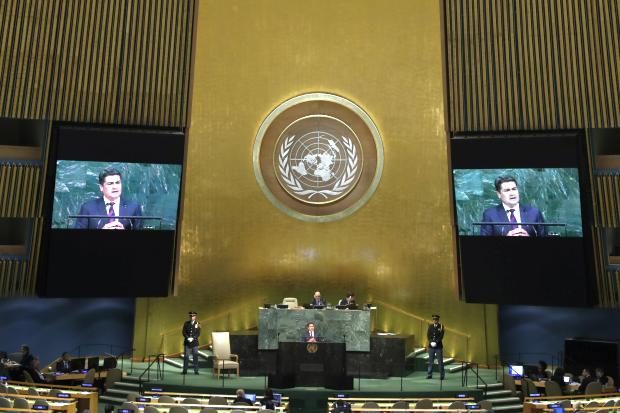Nations start signing nuke ban treaty opposed by big powers

Honduran President Juan Orlando Hernandez addresses the United Nations General Assembly Tuesday, Sept. 19, 2017, at the United Nations headquarters. (Photo by FRANK FRANKLIN II / AP)
UNITED NATIONS — Nations on Wednesday began signing the first treaty to ban nuclear weapons, a pact backed by over 100 countries but spurned by those with nuclear arms.
The UN treaty office said 51 countries are expected to attach their names on the opening day for signatures. Brazilian President Michel Temer was first to sign.
The treaty requires all countries that eventually ratify it not to develop, test, produce, manufacture, otherwise acquire, possess or stockpile nuclear weapons “under any circumstances.”
Wednesday, the opening day for signatures. Brazilian President Michel Temer was first to sign.
“This treaty is an important milestone towards the universally held goal of a world free of nuclear weapons” at a time of increasing concern about their risk, UN Secretary-General Antonio Guterres said as he opened the signing ceremony.
It came alongside the annual UN General Assembly meeting of world leaders. Many were set to address the assembly later in the day, while the Security Council had scheduled a high-level meeting on its far-flung peacekeeping operations.
More than 120 countries approved the nuclear ban in early July over strong opposition from nuclear-armed countries and their allies, who boycotted the negotiations.
Supporters of the pact say it’s time to push harder toward eliminating atomic weapons than nations have done through the nearly 50-year-old Nuclear Non-Proliferation Treaty.
“For decades, nuclear weapons have remained the only weapons of mass destruction not yet prohibited, despite their immense destructive power and threat to humanity,” said Beatrice Fihn, executive director of the International Campaign to Abolish Nuclear Weapons. She said that with tensions growing between the US and North Korea over the North’s nuclear program, the need for the treaty is even greater.
North Korea’s race to develop nuclear weapons that could hit the United States dominated Tuesday’s opening ministerial session of the assembly.
US President Donald Trump threatened to “totally destroy” the Asian nation if the US is forced to defend itself or its allies against aggression. Guterres warned that the threat of a nuclear attack is at its highest level since the end of the Cold War and “fiery talk can lead to fatal misunderstandings.”
But nuclear powers say a ban on the weapons won’t work.
French Foreign Minister Jean-Yves Le Drian said Monday that France refused to take part in negotiations on the treaty because it can only weaken the nuclear nonproliferation treaty. He called the nuclear ban treaty “wishful thinking” that is “close to irresponsible.”
Costa Rican President Luis Guillermo Solis said supporters of the treaty regretted the nuclear-armed nations’ position.
“We call upon them to join this date with history,” he said.
Later Wednesday, Guterres was expected to brief the Security Council meeting on reforming UN peacekeeping – a key item on the Trump administration’s agenda, which will be represented by Vice President Mike Pence.
Ethiopia’s UN Mission, which holds the council presidency, said nine presidents, three vice presidents, six prime ministers, three deputy prime ministers and more than 30 foreign ministers are scheduled to attend the daylong session. Some 71 countries have signed up to speak.
Members are expected to vote on a resolution that would recognize “the primacy of politics” including mediation, monitoring cease-fires and assisting the implementation of peace accords in the UN’s approach to resolving conflicts.
The draft resolution also underscores the need to enhance the overall effectiveness of peacekeeping operations and “the critical importance of improving accountability, transparency, efficiency and effectiveness.”
In the General Assembly, leaders from several dozen countries will address the 193-member world body, including the presidents of Iran and Ukraine, the prime ministers of Japan and the United Kingdom, and the Palestinian leader.














